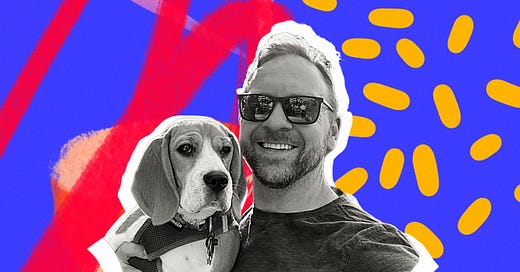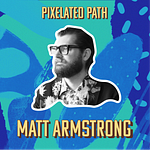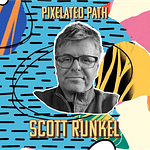What happens when you blend psychology, technology, and art? You get someone like Jess Holbrook, a pioneer in responsible AI. I recently had the pleasure of chatting with Jess on Pixelated Path, and his journey is nothing short of inspiring.
Breaking into HCI: The Early Days
Jess’s foray into HCI began during an internship at a startup in Eugene, Oregon. Tasked with designing a webpage to sell ads—with no prior coding experience—he dove in headfirst. Armed with a copy of Dreamweaver, he learned by trial and error, commenting out code to see what changed.
This hands-on experience led him back to his grad school advisor. “I’m interested in psychology, technology, and art,” he told him. The advisor’s response? “You should go into HCI.” That simple suggestion set Jess on a path that would define his career.
The Role of Art and Emotional Design
Art wasn’t new to Jess; his mother was a painter, and he grew up with an appreciation for creativity. However, it was during the iPod era that he noticed people's emotional reactions to technology. This intersection of emotion and design pulled him deeper into HCI.
Navigating Rejection and Early Career Challenges
Despite earning a PhD, Jess faced significant hurdles entering the job market. He applied to 50 jobs and received 49 rejections before landing a contractor role at Microsoft. “It felt terrible,” he admitted. The experience taught him resilience and the importance of self-motivation.
For those facing similar challenges today, Jess advises making the job search your full-time job while practicing self-care. “It’s hard not to take rejection personally,” he said, emphasizing the need to maintain balance during tough times.
The Value of a PhD in UX Research
Jess shared insights on pursuing a PhD, emphasizing that it should be driven by passion rather than career advancement. “You need to have an almost unhealthy obsession with the research topic,” he noted. While a PhD provides valuable tools and a deeper understanding of human-technology interactions, it’s not a guaranteed gateway to career success in UX Research.
Transitioning into Management
At Microsoft, Jess transitioned from an individual contributor to a management role. He emphasized the importance of transparency and respect when moving into leadership, especially when managing former peers or when others may have wanted the role. “I think that transparency helps,” he said, acknowledging that conversations can be awkward and crucial for building strong team dynamics.
Addressing Imposter Syndrome and Self-Awareness
Imposter syndrome is common in the tech industry, and Jess is no stranger to it. He stressed the importance of having an accurate self-assessment and being open to feedback. “The hardest thing is to have an accurate view of yourself,” he explained. He also warned about the dangers of overconfidence, which can be just as detrimental as self-doubt.
The Evolution of AI and Responsible Design
Jess’s career took a pivotal turn when he joined Google and later Meta, focusing on AI and responsible design. He recounted attending a presentation by Blaise Agüera y Arcas at Google, which ignited his passion for AI. Starting as a 20% project, his work in AI quickly became his full-time focus.
He emphasized the importance of building AI with values—fairness, safety, trust, and accountability. “If we believe this is going to be one of the most consequential technologies, then we better be sure that we build it responsibly,” he asserted.
Staying Sharp in a Rapidly Evolving Field
In a field as dynamic as AI, continuous learning is crucial. Jess shared his approach to staying updated: consuming a variety of newsletters and academic papers and actively using new products to understand design intentions. He also reads history and biographies to gain broader context, currently enjoying “Masters of Doom,” a book about the creators of the game Doom.
Advice for Aspiring AI and UX Professionals
For those early in their careers and interested in AI, Jess advises balancing technical awareness with practical application. “Assume AI will be woven in somehow,” he said, “but think about how it can provide the most value to people in a responsible way.” He encourages viewing AI as a design material—one of many tools at your disposal to create meaningful user experiences.
Final Thoughts
My conversation with Jess was both enlightening and motivating. His journey underscores the importance of resilience, continuous learning, and ethical considerations in technology. As AI continues to evolve, professionals like Jess remind us of the human element that must remain at the core of innovation.
Watch the Full Episode
Tune in to the full episode of Pixelated Path to learn more about Jess's experiences and insights.
I hope you found Jess’s story as inspiring as I did. I’d love to hear your thoughts and continue the conversation.
Don’t forget to subscribe to Pixelated Path so you never miss an episode packed with inspiring stories and career insights.
Thanks for reading!
Best,
Chris ✌️















Share this post